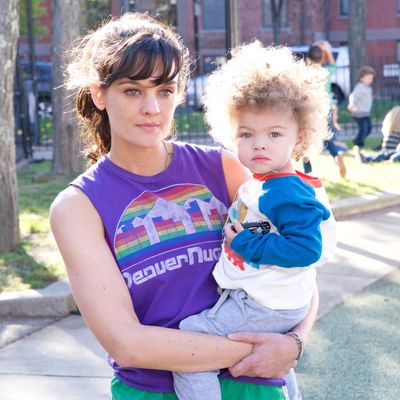
SMILF is not quite a great series yet. But in its initial trio of episodes, the first of which debuts Sunday on Showtime, it’s obvious it has the potential to get there.
Created by Frankie Shaw, who also stars as the single mom alluded to in that acronym of a title, SMILF sometimes suffers from being a little overcommitted to unseemliness. As Bridgette, a Boston single mother trying to raise her toddler in an apartment less spacious than a shoe box and with only occasional support from her baby-daddy (Miguel Gomez), Shaw plays a woman prone to succumbing to her worst impulses. Bridgette binge eats. She obsesses over the size and shape of her vagina. She falls asleep next to her child, with her vibrator still inside her. At one point she has sex with a college student she used to tutor only a year or two ago, when he was still in high school.
Basically, Bridgette’s kinda messed up, and the first two or three episodes are so determined to make that clear that they sometimes feel forced and too derivative of the comedic depictions of reprehensible people that have saturated television, as well as film, in recent years. (See Showtime’s own Shameless, FX’s You’re the Worst, Bad Moms, etc.) But SMILF also gets a lot of things right, most notably its honest depiction of the daily chaos inherent in meeting one’s parenting responsibilities while trying to scrape together a living from part-time and other one-off gigs. In that sense, SMILF functions a bit like a companion piece to Better Things, except that, unlike Pamela Adlon’s Sam, Bridgette doesn’t live in a nice L.A. home or have a solid financial cushion courtesy of her years as a child actor. Bridgette has very little money, and the undercurrent of constant, low-key panic that accompanies her near poverty is always present.
Like Better Things, SMILF is also very interested in showing us an array of women who are all struggling in their own ways. Bridgette’s mother Tutu (a thoroughly believable Rosie O’Donnell) is a blunt-talking coupon clipper who, as we learn in the second episode, imagines, with regret, an entire road she might have taken but didn’t. Lily (Connie Britton, great as always) is the wealthy mom of the entitled kids that Bridgette tutors and looks like the stock image for having it all … until Bridgette finds her secretly scarfing down McDonald’s in her garage when she’s supposed to have gone to yoga. The third episode opens with a montage that depicts Bridgette and two of her acquaintances subjecting themselves to various forms of lightly sexualized indignity, all in the name of making a buck. One of the best things about SMILF is the way it depicts female resilience in many different contexts. Women: They keep calm, they keep cutting their coupons, and they carry on.
Shaw, who previously appeared on Mr. Robot as Elliot’s troubled girlfriend Shayla, plays Bridgette, even at her most stressed, with a dialed-down sort of casualness that suits the tone of the series. Everything about her performance conveys the weariness of a mom who’s just plain tired, but also tired of dealing with the same old shit. But every once in a while, we can see a spark light in her, something that happens in the excellent third act of episode three, in which Bridgette’s long-squashed dreams of being a basketball player are reignited by a man with whom she shares a soda at a grocery-store food court.
Everything that happens in that part of the episode is consistently surprising, engrossing, and steeped in an environment that feels authentic. Watching what happens between Bridgette and this man feels like watching real life unfold.
That’s what SMILF is like when it’s at its best. Hopefully, as its first season continues, it will feel like that all the time and not just some of the time.





